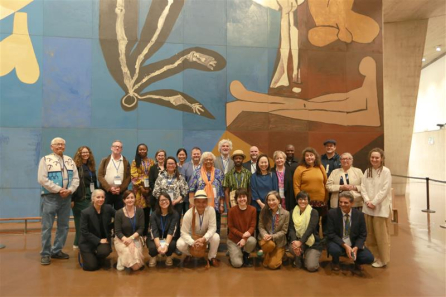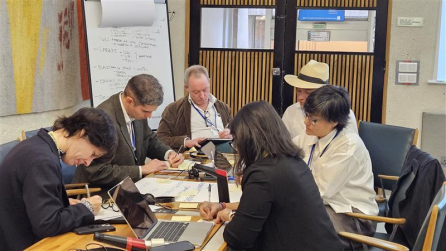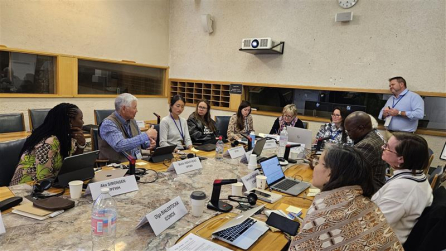باريس – أيار/ مايو 2025 – في لقاء يُعد محطة مفصلية، تضافرت جهود قيادات من الشعوب الأصلية مع خبراء التراث وممثلي المنظمات الدولية لرسم مسار جديد لحماية التراث، يقوم على أسس الشراكة والاحترام والإشراف المشترك. وقد نظم هذا الحدث بتنسيق مشترك بين إيكروم، والمنتدى الدولي للشعوب الأصلية من أجل التراث العالمي (IIPFWH)، واليونسكو، والمجلس الدولي للمعالم والمواقع – إيكوموس والاتحاد الدولي لحفظ الطبيعة، وهو يمثل خطوة مهمة نحو تعزيز مشاركة الشعوب الأصلية بشكل أقوى وأكثر شمولاً في تنفيذ اتفاقية التراث العالمي.
وبفضل الدعم السخي من حكومتي أستراليا وكندا، صُممت ورشة العمل حول التراث العالمي والشعوب الأصلية – بناء المشاركة وضمان الموافقة الحرة المسبقة والمستنيرة (FPIC) بهدف عام وشامل يتمثل في إحداث تغيير في كيفية إشراك الشعوب الأصلية ضمن عمليات تنفيذ اتفاقية التراث العالمي، ووضع أسس للتعاون المستقبلي.
قراءة اتفاقية التراث العالمي من منظور الشعوب الأصلية
كانت ورشة العمل، التي عقدت في مقر اليونسكو في باريس خلال الفترة من 26 إلى 28 أيار/ مايو، تجربة تعليمية متبادلة لجميع المؤسسات المشاركة. إذ وفرت فرصة لفهم الأدوار والمسؤوليات الحالية للمشاركين، وتحديد الثغرات التي يمكن من خلالها تخطيط وتنفيذ إجراءات فورية وطويلة الأمد لتعزيز مشاركة الشعوب الأصلية في عمليات حماية التراث العالمي.
وعلى مدار ثلاثة أيام، شكلت ورشة العمل مساحة للنقاشات الرئيسية، شملت التقاطع الواسع بين الشعوب الأصلية والتراث، مثل تحديد مفهوم الشعوب الأصلية ضمن بيان يتسم بالشمولية، وتطبيق مبدأ الموافقة الحرة المسبقة والمستنيرة (FPIC)، والسعي نحو الإدارة المتكافئة، ومن ثم الاعتراف بالقيم المتنوعة وعلاقتها بالقيمة العالمية البارزة للتراث العالمي.
من خلال إتاحة الفرصة لتحليل الإجراءات المختلفة لاتفاقية التراث العالمي، تعمق المشاركون في العمليات المتعلقة بالترشيحات، بما في ذلك الإدراج في القائمة المؤقتة، والتقييم الأولي، وتقييم ملفات الترشيح، إضافة إلى العمليات المتعلقة بالإدارة مثل التخطيط والتنفيذ الإداري، وآلية الرصد التفاعلي وإعداد التقارير الدورية. ومن ثم تحديد المراحل التي يمكن فيها تطبيق مبدأ الموافقة الحرة المسبقة والمستنيرة (FPIC) وممارستها بشكل أفضل في هذه العمليات.
التزام إيكروم بحماية التراث المرتكز على الإنسان
بالنسبة لإيكروم، يعد تبني نُهج ترتكز على الإنسان وتقوم على خصوصية المكان جوهر جهود الحفظ، إذ تكمن الحماية والإدارة في احترام وإشراك المجتمعات التي تقدر التراث وتسهم في صناعته.
يُعد الاعتراف الفعال بنظم المعارف التقليدية والمحلية للشعوب الأصلية واستيعابها في حفظ التراث وإدارته خطوة متقدمة نحو تحقيق ترتيبات إدارية عادلة، بما يضمن الشمولية، والتوزيع المنصف للمنافع، إلى جانب اعتماد تدابير أكثر فاعلية وكفاءة للحد من المخاطر، بما يسهم في حفظ التراث وحمايته.
جنباً إلى جنب مع شركائها، تواصل إيكروم التزامها العميق بمواصلة البحث وتطوير الموارد والممارسات اللازمة لدعم جهود حفظ التراث بقيادة الشعوب الأصلية. فهذه الورشة لا تعد نهاية للحوار، بل بداية لمسار جماعي نحو إشراف أكثر إنصافاً على مواقع التراث الثمينة حول العالم.



